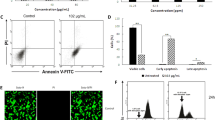Abstract
The anti-tumor effects of a newly-discovered lectin, isolated from okra, Abelmoschus esculentus (AEL), were investigated in human breast cancer (MCF7) and skin fibroblast (CCD-1059 sk) cells. AEL induced significant cell growth inhibition (63 %) in MCF7 cells. The expression of pro-apoptotic caspase-3, caspase-9, and p21 genes was increased in MCF7 cells treated with AEL, compared to those treated with controls. In addition, AEL treatment increased the Bax/Bcl-2 ratio in MCF7 cells. Flow cytometry also indicated that cell death (72 %) predominantly occurred through apoptosis. Thus, AEL in its native form promotes selective antitumor effects in human breast cancer cells and may represent a potential therapeutic to combat human breast cancer.




Similar content being viewed by others
References
Begnini KR, Rizzi C, Campos VF, Borsuk S, Schultze E, Yurgel VC, Nedel F, Dellagostin OA, Collares T, Seixas FK (2013) Auxotrophic recombinant Mycobacterium bovis BCG overexpressing Ag85B enhances cytotoxicity on superficial bladder cancer cells in vitro. Appl Microbiol Biotechnol 97:1543–1552
Campos VF, Collares T, Deschamps JC, Seixas FK, Dellagostin OA, Lanes CF, Sandrini J, Marins LF, Okamoto M, Sampaio LA, Robaldo RB (2010) Identification, tissue distribution and evaluation of brain neuropeptide Y gene expression in the Brazilian flounder Paralichthys orbignyanus. J Biosci 35:405–413
Chan YS, Ng TB (2013) A lectin with highly potent Inhibitory activity toward breast cancer cells from edible tubers of Dioscorea opposita cv. Nagaimo. PLoS One 8:e54212
Chan YS, Wong JH, Fang EF, Pan W, Ng TB (2012) Isolation of a glucosamine binding leguminous lectin with mitogenic activity towards splenocytes and anti-proliferative activity towards tumor cells. PLoS One 7:e38961
Damodaran D, Jeyakani J, Chauhan A, Kumar N, Chandra NR, Surolia A (2008) Cancer LectinDB: a database of lectins relevant to cancer. Glycoconj J 25:191–198
Eligar SM, Pujari R, Swamy BM, Shastry P, Inamdar SR (2012) Sclerotium rolfsii lectin inhibits proliferation and induces apoptosis in human ovarian cancer cell line PA-1. Cell Prolif 45:397–403
Elmore S (2007) Apoptosis: a review of programmed cell death. Toxicol Pathol 35:495–516
Forouzanfar MH, Foreman KJ, Delossantos AM, Lozano R, Lopez AD, Murray CJ, Naghavi M (2011) Breast and cervical cancer in 187 countries between 1980 and 2010: a systematic analysis. Lancet 378:1461–1484
Friedenreich CM (2011) Physical activity and breast cancer: review of the epidemiologic evidence and biologic mechanisms. Recent Results Cancer Res 188:125–139
Hu L, Sun Y, Hu J (2010) Catalpol inhibits apoptosis in hydrogen peroxide-induced endothelium by activating the PI3 K/Akt signaling pathway and modulating expression of Bcl-2 and Bax. Eur J Pharmacol 628:155–163
Huang LH, Yan QJ, Kopparapu NK, Jiang ZQ, Sun Y (2012) Astragalus membranaceus lectin (AML) induces caspase-dependent apoptosis in human leukemia cells. Cell Prolif 45:15–21
Jimenez-Castells C, de la Torre BG, Andreu D, Gutierrez-Gallego R (2008) Neo-glycopeptides: the importance of sugar core conformation in oxime-linked glycoprobes for interaction studies. Glycoconj J 25:879–887
Kim MS, Lee J, So HS, Lee KM, Jung BH, Chung SY, Moon SR, Kim NS, Ko CB, Kim HJ, Kim YK, Park R (2001) Gamma-interferon (IFN-gamma) augments apoptotic response to mistletoe lectin-II via upregulation of Fas/Fas L expression and caspase activation in human myeloid U937 cells. Immunopharmacol Immunotoxicol 23:55–66
Lei HY, Chang CP (2009) Lectin of Concanavalin A as an anti-hepatoma therapeutic agent. J Biomed Sci 16:10
Lu CC, Yang JS, Huang AC, Hsia TC, Chou ST, Kuo CL, Lu HF, Lee TH, Wood WG, Chung JG (2010) Chrysophanol induces necrosis through the production of ROS and alteration of ATP levels in J5 human liver cancer cells. Mol Nutr Food Res 54:967–976
Pinto LS, Nagano CS, Oliveira TM, Moura TR, Sampaio AH, Debray H, Pinto VP, Dellagostin OA, Cavada BS (2008) Purification and molecular cloning of a new galactose-specific lectin from Bauhinia variegata seeds. J Biosci 33:355–363
Sanchez-Pomales G, Morris TA, Falabella JB, Tarlov MJ, Zangmeister RA (2012) A lectin-based gold nanoparticle assay for probing glycosylation of glycoproteins. Biotechnol Bioeng 109:2240–2249
Soares GSF, Assreuy AMS, Gadelha CAA, Gomes VM, Delatorre P, Simões RS, Cavada BS, Leite JF, Nagano CS, Pinto NV, Pessoa HLF, Santi-Gadelha T (2012) Purification and biological activities of Abelmoschus esculentus seed lectin. Protein J 31:674–680
Taylor WR, Stark GR (2001) Regulation of the G2/M transition by p53. Oncogene 20:1803–1815
Wang WL, McHenry P, Jeffrey R, Schweitzer D, Helquist P, Tenniswood M (2008) Effects of iejimalide B, a marine macrolide, on growth and apoptosis in prostate cancer cell lines. J Cell Biochem 105:998–1007
Acknowledgments
This work was supported by Coordenação de Aperfeiçoamento de Pessoal de Nível Superior (CAPES), Grants no 02841/09-6 and 23.038.019120/9-3, Fundação de Amparo a Pesquisa do Rio Grande do Sul (FAPERGS), Grants no. 11/1842-5 and Conselho Nacional de Pesquisa (CNPq). The authors also wish to thank Dr. Cláudia Pinho Hartleben, MSc. Eduarda Schultze, MSc. Karine Rech Begnini and MSc. Virginia Campello Yurgel for their valuable technical assistance with the flow cytometric analysis.
Author information
Authors and Affiliations
Corresponding author
Electronic supplementary material
Below is the link to the electronic supplementary material.
Fig. S1
Evaluation of AEL by SDS-PAGE after the purification and quantification assays. Column "M": Molecular Weight Markers (GE Healthcare, Life Sciences). Column "1" Abelmoschus esculentus lectin (AEL) (JPEG 13 kb)
Rights and permissions
About this article
Cite this article
Monte, L.G., Santi-Gadelha, T., Reis, L.B. et al. Lectin of Abelmoschus esculentus (okra) promotes selective antitumor effects in human breast cancer cells. Biotechnol Lett 36, 461–469 (2014). https://doi.org/10.1007/s10529-013-1382-4
Received:
Accepted:
Published:
Issue Date:
DOI: https://doi.org/10.1007/s10529-013-1382-4




